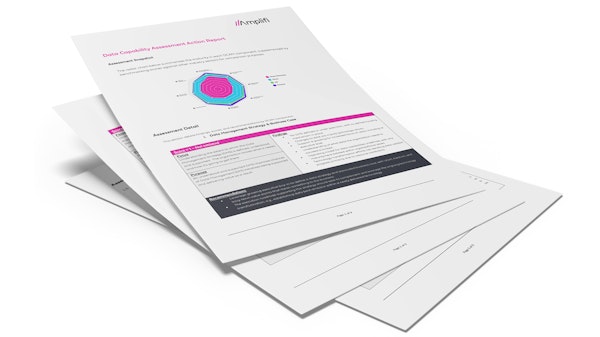Salesforce’s acquisition of Informatica sends a strong message. Even a company at the forefront of AI innovation with Einstein is heavily investing in the foundations of data management. It is clear validation from the top that foundational data management technology still matters. No amount of front-end innovation can succeed without a solid data foundation. It also backs up what we’ve witnessed in our conversations around modern data ecosystems - the market still sees these platforms as central to delivering value.
High quality data remains key. This is an ongoing investment that highlights the ongoing need for strong data governance, data quality and complete articulate, high value data. When your data is usable and connected, it becomes a strategic asset that you can get value from.
With this acquisition, Salesforce is aiming to become the essential business platform, underpinned by strong data foundations. They’re turning core data management capabilities into something business-ready, applying the same approach it used to streamline workflows through its CRM.
Takeaway: The foundation of enterprise data management, AI and analytics remains high-quality, well-managed data, and Salesforce’s strategic bet validates this.
2. The rise of Data Products
The acquisition points to the growing importance of data products to help organizations scale effectively.
Data products offer a more scalable, outcome-focused way of working with data. They combine trusted, well-governed assets with clear business purpose, such as customer segmentation or sales forecasting. They are designed to be reusable, discoverable and continuously improved. Data products act as a layer of abstraction to help organizations think differently about how to scale and deliver value from data in a more future-ready way.
What Salesforce have done well is create a business language layer that makes complex data more accessible. In doing so they’ve helped normalise the concept of data products. From our perspective, part of their success comes from how they manage the backend, by building data products and connecting users to them. This layer of abstraction connects people to a more complex world of data in a way that feels more usable and familiar.
It brings the idea of data ownership closer to the end user. For organizations already thinking in terms of customers as data products, this shift wouldn’t be a big leap. It’s a practical way to scale and a clear sign of where the market is heading.
Takeaway: To scale effectively, organizations must move beyond data pipelines to create a product-oriented mindset.
3. Best of breed vs. Platform reality
When choosing a technology, it’s necessary to be a realist. A best-of-breed solution might be the right answer for a specific need, but a wider ecosystem or other factors might mean a platform approach makes more sense.
It all depends on what problem you’re solving, and the size and scope of it. These decisions need practical data strategies that balance capability with cost, cohesion, and usability.
Relying on a single technology vendor can make it harder to adapt when things change. While having one provider across your ecosystem, like Informatica, Microsoft or IBM, can bring consistency, it also has limits. When the market moves, you may find yourself waiting for your vendor to catch up. Composable architectures offer a more flexible alternative. These systems can be broken apart, extended, and integrated with new capabilities as needed. This makes it easier to respond to emerging technologies and evolving business needs without being held back by rigid platforms.
So, is Informatica the perfect best-of-breed tool, and is that why Salesforce have acquired them? Not necessarily. This move is more about what Salesforce wants to enable. Their focus is on getting access to more data, better data, and doing it in a way to remove friction for their customers.
The move signals a shift towards more integrated solutions, simplified vendor relationships and fewer moving parts, especially for customers already in the Salesforce ecosystem. Whether you're a PIM buyer or a broader data leader, these integrations impact your decision-making.
Takeaway: It’s not about finding the best tool in isolation, but choosing the solution that fits your goals, works within your ecosystem, and makes it easier to deliver real results.
Preparing for change, how Amplifi can help
At Amplifi, we know that a modern data ecosystem doesn’t need to come from a single suite. As a vendor-agnostic consultancy, we help organizations build composable data stacks that are flexible, scalable and fit for purpose.
If you’re considering how your organization can prepare your data ecosystem to be more adaptable to change, we’re here to help. In our article, 5 ways to design your data ecosystem for change in a continuously evolving world, we cover how to stay ahead in a shifting landscape, especially as platforms consolidate and new capabilities emerge.
If you’re an Informatica or Salesforce customer, and not sure what this move means for your organization, or want to ensure you’re making the best decision for the future of your organization’s data ecosystem, we’re happy to help you figure it out.
Our Modern Data Ecosystem Capability Assessment might be the best next step, request your assessment below, or get in touch directly to speak with one of our data experts about your organization’s unique needs.
Request a Modern Data Ecosystems Capability Assessment
Unsure on what your organization needs, your current capabilities or where to get started?
Amplifi offer a range of capability assessments designed to assess your readiness for various aspects of data management. Our Modern Data Ecosystems Capability Assessment can help your organization understand its current maturity, identify capability gaps, and uncover the practical steps needed to drive business outcomes with a modern data ecosystem. Learn more and request your capability assessment below.




